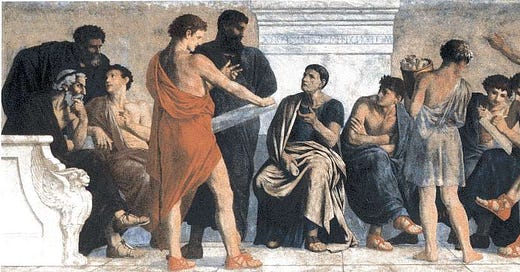A conversation I recently had with a Jehovah’s Witness (JW) perfectly illustrates the problem of the importing man-made philosophy into Scripture. I will paraphrase the conversation below with some commentary interspersed, then I will move on to how Catholics do something similar and how we should approach philosophy and Scripture.
JW: What religion do you practice?
Me: I am a Presbyterian, so Christian.
JW: Well, we would say that we are Christians as well.
Me: Do you accept the doctrine of the Trinity?
JW: No.
Trinitarian doctrine is essential to Christianity. While it may not have been explicit in the early church, it was still there.
In John’s Gospel, Jesus is identified as the Word (Logos), which was not only with God at the beginning of the time but was (or is) God; thereby establishing two different persons/identities—God (Theos) and the Word/Jesus/Son (Logos)—and the relationship between them (John 1:1-14). This is the God, the Father, and God, the Son, relationship.
The Lord is further identified as the Spirit (Pneuma)—the same Holy Spirit (Pneuma theos) which is described at length in the New Testament (2 Corinthians 3:17).
This is made more evident in the Septuagint, the Greek translation of the Hebrew Old Testament—the same translation which the New Testament writers quoted. God created the world, and in the world’s primeval state, the Spirit of God (Pneuma theos) “moved over the water,” (Lancelot Brenton, Genesis 1:2).
God is tri-personal: the Father, the Son, and the Holy Spirit. These are three distinct persons, yet they are equivalent with one another—sharing the same undividable substance—which is spirit (pneuma).
Other verses could be cited to justify this doctrine, but this is sufficient for now (as this is not primarily a defense of the Trinity). What was the response?
JW: The Trinity does not make sense to me. Everyone who has explained it to me gets confused.
Me: Yes, if you try to fit the Trinity into preconceived notions of metaphysics, then you are going to have a difficult time making sense of the Trinity; it may even be impossible to make sense of it using man-made metaphysics. The question is, “Can you make sense of the Trinity within Christian metaphysics?”
The JW was in agreement with me on this point, yet they still maintain their anti-Trinitarian position. Why? Because they cannot abandon their preconceived, unjustified human metaphysic and embrace a Biblical, Christian metaphysic—a metaphysic which they already acknowledged as being correct. As a consequence of their incapacity of accepting a Biblical metaphysic, they cope by translating Scripture in a way which affirms what they wish Christianity is and not what it really is. As we know, altering or changing the Word of God comes with serious consequences (Deuteronomy 4:2, Revelation 22:18-19).
Roman Catholics
The Roman Catholics are guilty of importing human metaphysics into theology as well. To them it is not enough to accept a spiritual (pneumatic) presence of Jesus in the Lord’s Supper (John Calvin, A Short Treatise on the Lord’s Supper) or some variation of bodily presence; one must also accept the Roman Catholic understanding (transubstantiation), even if both are in agreement that the bread is His body, and the wine is His blood. Their understanding demands the acceptance of an Aristotelian-Thomistic metaphysic, not a Biblical metaphysic. The metaphysical claims in Scripture are not evaluated by the standards of Scripture, but by the standards of secular philosophy. This is an error.
The Roman Catholics will maintain that they are not requiring the acceptance of Aristotelianism. However, they affirm that explaining the Supper using Aristotelian metaphysics is not only advisable, but dogma. How is that not demanding acceptance of Aristotelianism?
It is certainly fine to use secular philosophy to understand Scripture, but when the interpretation conflicts with Scripture or communion with other Christians, then the accuracy or validity of the philosophical import must be questioned.
If a rigid interpretation of Scripture along Aristotelian-Thomistic lines leads to irreconcilable differences between Christians of competing metaphysics, then the latter should not be labeled an excommunicant while the former orthodox. The right question is to ask, “Is this metaphysic compatible with Scripture?” If yes, then of course one can hold interpretations along the lines of that metaphysic. However, it should be preferred that one construct their metaphysic from Scripture alone. Any secular metaphysic should be for personal edification, not a point of dogma.
Unfortunately, Rome is enamored by Aristotelianism and Thomism, and the JWs are enamored by modernism and scientism. They have let these worldviews run amok and drive a wedge between Christian communion. Human traditions have become non-negotiables. This is not a desirable state of affairs.



